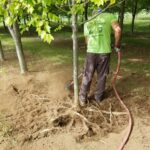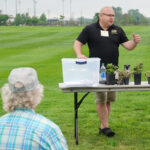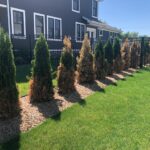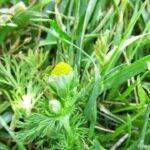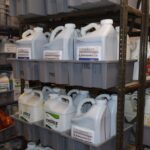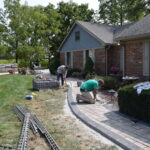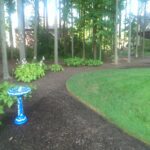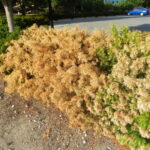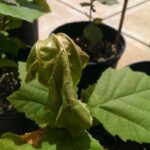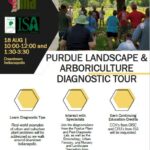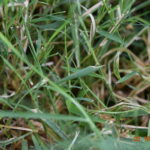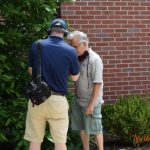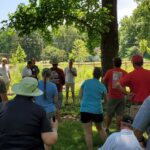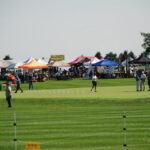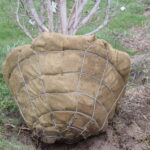A new community of Green Industry professionals, Women of the Green industry, is inviting you to a free, virtual professional development opportunity on November 1st. Women of the Green Industry was formed to attract and retain more females to the industry by creating networking opportunities, providing education, and build a community of leaders. This group[Read More…]
When transplanting trees, it is important to consider the long-term viability. Since the typical life span of an urban tree is 7-20 years (USDA), proper establishment techniques are very important to decrease this mortality rate. When a tree becomes established, it is much more difficult to correct below ground problems. Root deformations can occur for[Read More…]
About ten years ago I was listening to a talk by a climatologist. She indicated that data is trending towards more floods and more droughts in the Midwest. At first listen this made absolutely no sense. How can a place simultaneously have more flooding and more drought? Well, if you’ve paid attention over the last[Read More…]
Join us at the Purdue Turf and Landscape Field Day on July 26th! The Purdue Turf and Landscape Field Day is an annual one-day event with the objective of providing professional turf and landscape managers exposure and educational opportunities with the latest research and technical resources. The Field Day features research tours, talks on current[Read More…]
Arborvitae (Thuja spp.) fulfill several crucial roles in the landscape, especially windbreaks and screens (Fig. 1). Their relatively fast growth habit, wide variety of available forms, and inexpensive price point make them one of the most common conifers in the Midwest landscape. Due to the ubiquitous use of arborvitae, and their perceived problems, the Green[Read More…]
Biology: Pineapple weed (Matricaria matricariodies), behaves as either a summer or winter annual and it is commonly found throughout the United States. It is a weed of both high- and low-maintenance turfgrass lawns, landscapes, and nursery crops. Its ability to tolerate low mowing heights and highly compacted soils allow pineapple weed to compete with in weak[Read More…]
Offering 27 virtual, on-demand sessions from the IGE 2022 Live Educational Program Only available until May 31st, so sign up now! UNABLE TO ATTEND OUR IN-PERSON EVENT IN JANUARY? NEED TO EARN CCHS/CEUS? THIS VIRTUAL PROGRAM PROVIDES A GREAT OPPORTUNITY TO GAIN VALUABLE KNOWLEDGE AND EARN CREDITS ON YOUR SCHEDULE, AT YOUR OWN PACE. Click here[Read More…]
Surflan (oryzalin) is a part of many preemergence weed control programs. Being in the dinitroaniline (DNA) herbicide family (along with trifluralin, pendimethalin, prodiamine, and others), this product controls many weeds with minimum phytotoxicity to landscape plants. Oryzalin is also on the lower end of preemergence herbicide pricing, thus increasing the use of this product. You[Read More…]
It’s almost the time of the year to begin evaluating the season and looking forward to 2022 (after a trip or two to somewhere warmer for many of you) after the second of two of the busiest seasons on record. Though no one (or very few) is complaining about the glut of work available over[Read More…]
How did your weed control program perform this year? Could you be 10% more efficient? Could you make your clients 10% more satisfied with the level of weed control? In today’s labor market, improving efficiency is the single best way to reallocate labor to other, more profitable, jobs. One aspect of improving efficiency in your[Read More…]
Depending on where you are located in the Midwest, rainfall in 2021 has either been too much or too little. This trend was forecasted several years ago by climatologists, in that more droughts and more floods are projected as the ramifications of climate change take shape in the future. Though this statement doesn’t make logical[Read More…]
Phytotoxicity is damage to plants caused by chemicals, fertilizers, or pesticides. Phytotoxicity can be a positive (killing weeds) or a negative (damage from pesticides on ornamental plants), depending on the intended results. Some of the common phytotoxic effects can show symptoms such as stunting of leaves and whole plant, necrosis (death), chlorosis (yellowing), abnormal growth[Read More…]
THREE DAYS REMAINING TO REGISTER! Join Purdue Extension Specialists and Diagnosticians on August 18, 2021 in downtown Indianapolis for a walking tour of diagnosing plant problems. In addition to the Purdue Plant and Pest Diagnostic Lab diagnosticians, the entomology, urban forestry, and nursery and landscape specialists will guide attendees through the diagnostic process and provide[Read More…]
Biology: Common bermudagrass (Cynodon dactylon) is the most commonly used turfgrass in the southern United States, but it is also a difficult-to-control weed in northern turf. Bermudagrass is a drought tolerant, warm-season, perennial grass species that tolerates low mowing and actively spreads vegetatively by both rhizomes and stolons but also has the ability to spread by[Read More…]
Diagnosing herbicide injury on ornamental plants can be difficult due to the sheer number of cultivated plants and the number of active ingredients used around ornamentals. Modern cultivars of ornamental plants include characteristics much different from the species, so it’s important to know ‘normal’ to properly diagnose a problem. There are several reasons that herbicide[Read More…]
Join Purdue Extension Specialists and Diagnosticians on August 18, 2021 in downtown Indianapolis for a walking tour of diagnosing plant problems. In addition to the Purdue Plant and Pest Diagnostic Lab diagnosticians, the entomology, urban forestry, and nursery and landscape specialists will guide attendees through the diagnostic process and provide solutions to problems encountered on[Read More…]
The Purdue Turf and Landscape Field Day will be back July 13th! Join us at the Daniel Turfgrass Research and Diagnostic Center on the Purdue University West Lafayette campus. The Purdue Turf and Landscape Field Day is an annual one-day event with the objective of providing professional turf and landscape managers exposure and educational opportunities[Read More…]
There are many age-old, philosophical questions that people have been arguing over for many years. What is the meaning of life? Nature or nurture? Do aliens exist? Should I remove the wire and burlap from B&B plant material? The last question has been debated for many years, with almost everyone having a different opinion. There[Read More…]


